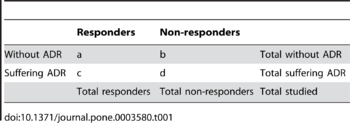Net efficacy adjusted for risk: Difference between revisions
Jump to navigation
Jump to search
imported>Robert Badgett (New page) |
imported>Robert Badgett No edit summary |
||
| Line 6: | Line 6: | ||
{{Image|Journal.pone.0003580.t001.png|right|350px|2×2 table combining efficacy and safety results of a theoretical controlled randomized clinical trial.}} | {{Image|Journal.pone.0003580.t001.png|right|350px|2×2 table combining efficacy and safety results of a theoretical controlled randomized clinical trial.}} | ||
{{Image|Journal.pone.0003580.t003.png|right|350px|Re-arrangement of results from typical two-by-two table for calculating NEAR RR or NEAR OR.}} | |||
Using the second table, let b1+c1+d1 = S1 and b2+c2+d2 = S2. Then | |||
:<math>\mbox{Net efficacy adjusted for risk (NEAR RR)} =\left (\frac{a_1 / n_1}{a_2 / n_2}\right)</math> | |||
:<math>\mbox{Net efficacy adjusted for risk (NEAR OR)} =\left (\frac{a_1 * S_2}{a_2 * S_1}\right)</math> | |||
The 95% [[confidence interval]]s can be calculated by the method of Boada.<ref name="pmid18974868">{{cite journal| author=Boada JN, Boada C, García-Sáiz M, García M, Fernández E, Gómez E| title=Net efficacy adjusted for risk (NEAR): a simple procedure for measuring risk:benefit balance. | journal=PLoS One |year= 2008 | volume= 3 | issue= 10 | pages= e3580 | pmid=18974868 | doi=10.1371/journal.pone.0003580 | pmc=PMC2570485 |url=http://www.ncbi.nlm.nih.gov/entrez/eutils/elink.fcgi?dbfrom=pubmed&tool=sumsearch.org/cite&retmode=ref&cmd=prlinks&id=18974868 }} </ref> | |||
==References== | ==References== | ||
<references/> | <references/> | ||
Revision as of 12:43, 22 December 2013
In statistics, net efficacy adjusted for risk (NEAR) is a measure that combines measure of efficacy and risk into a single metric.[1][2] For example, the relative risk of efficacy can be combined with the relative risk for drug toxicity into a single NEAR RR. Alternatively, the odds ratio of efficacy can be combined with the odds ratio for drug toxicity into a single NEAR OR.
Using the second table, let b1+c1+d1 = S1 and b2+c2+d2 = S2. Then
The 95% confidence intervals can be calculated by the method of Boada.[1]
References
- ↑ 1.0 1.1 Boada JN, Boada C, García-Sáiz M, García M, Fernández E, Gómez E (2008). "Net efficacy adjusted for risk (NEAR): a simple procedure for measuring risk:benefit balance.". PLoS One 3 (10): e3580. DOI:10.1371/journal.pone.0003580. PMID 18974868. PMC PMC2570485. Research Blogging.
Cite error: Invalid
<ref>tag; name "pmid18974868" defined multiple times with different content - ↑ Boada J, Boada C, Garcia MM, Rodriguez C, Garcia M, Fernandez E (2009). "Net efficacy adjusted for risk: further developments.". Expert Opin Drug Saf 8 (6): 649-54. DOI:10.1517/14740330903241576. PMID 19708816. Research Blogging.





